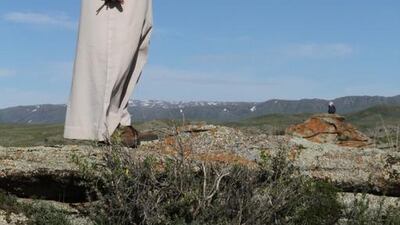ABU DHABI // Twenty-two peregrine falcons and four saker falcons have been released into the wild in Kazakhstan as part of the Sheikh Zayed Falcon Release Programme.
Now in its 22nd year of operation, it is also the eighth time for the programme to organise a release in the central Asian country. Over this period, 1,752 falcons have been released into the wild since the programme’s inception in 1995.
“Recent research has shown that a significant number of falcons use the Karaganda region in central Kazakhstan as a breeding spot or as a stop-off location on their migration route from Russia onto southerly located wintering areas,” a statement from the project said.
“Subsequent surveys also confirmed that the region is home to a large number of suitable prey for falcons such as pigeons, ducks and rodents, making it an ideal spot to ensure their successful release.”
The majority of releases have been focused in central Asia, Pakistan, Iran and Kyrgyzstan, as well as Kazakhstan.
“Observations made throughout the programme have shown, however, that Kazakhstan provides the perfect environment for the survival of falcons thanks to its varied topography, from its mountainous regions to vast wild plains located within the migration route of falcons, providing them with the optimum environment to both hunt and breed,” the programme said.
Before release, falcons must undergo extensive training and medical checks to make sure they are fit enough to survive in the wild.
The birds are also fitted with microchips to allow for tracking of migration routes and survival rates. In this release, four peregrine and four saker falcons were tagged with satellite-operated, solar-powered battery tracking to provide the information.
newsdesk@thenational.ae

